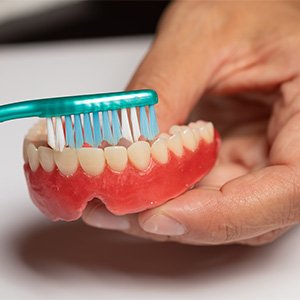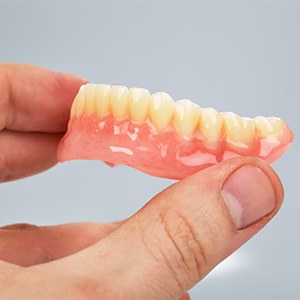Dentures – Fort Worth, TX
A Long-Standing Solution for Smile Gaps

As a working adult, losing teeth isn’t a harmless issue you can just ignore. Going without a full grin makes many daily tasks – even things like eating and speaking – quite tricky. The good news is that there’s a tried-and-true way to bring your whole smile back: dentures in Fort Worth! By getting these notable tooth replacements, we at Care32 Dental will address your mouth’s empty spaces. Learn more about them by reading below, or consider booking a visit soon!
Who is a Good Candidate for Dentures?

So long as they’re decently healthy, most adults with missing teeth can get dentures. That said, there are times when a patient may not be well-suited for them. Someone may do better with a different restoration if they haven’t lost all the teeth along an arch. On the other hand, a would-be candidate may not have the healthy gums needed to support dentures.
In line with these facts, please consult our dentists to learn if dentures suit you. They can give you a quick oral exam to check if the prosthetics would help. In case they would, our team will draft a custom treatment plan tailored to you.
Types of Dentures

Depending on your consultation’s results, we suggest you get one of three possible types of dentures. These are the following:
Partial Dentures
A partial denture is one that (per its name) only replaces a few teeth. Given this limit, the device fits over a patient's gumline with suction or clasps onto abutments (i.e., nearby natural teeth). It then relies on its base's pink coloring and artificial teeth to blend with your grin.
A partial denture’s base uses acrylic to match your gum tissue, while each artificial tooth has the same shade as your enamel.
Full Dentures
Unlike a partial one, a full denture replaces an entire arch of teeth at once. That means it only uses suction force (or adhesives) to stay in place; it won’t alter your other teeth by using clasps. However, note that a full denture uses the same sort of materials as a partial kind. Both devices rely on gum-colored bases and porcelain or ceramic artificial teeth.
Implant Dentures
If you want a more lasting tooth replacement option, consider implant dentures. These sorts secure themselves with dental implants – metal posts that fuse with your jawbone. So, a well-placed implant denture will remain stable and secure over time. It shouldn’t slip or fall from your mouth like a traditional one would, and it’ll prevent facial collapse.
The Benefits of Dentures

If you opt for dentures at our office, you’ll enjoy treatment benefits like:
- A Lifelike Smile – Given their great materials, today’s dentures can restore smiles with lifelike and realistic results. They fill your smile gaps with teeth that blend seamlessly with their surroundings.
- Boost to Confidence – By getting rid of your smile gaps, dentures tend to boost a patient’s confidence. Wearing them should help you feel more self-assured in social settings.
- Better Nutrition – Dentures improve your eating ability due to giving you new teeth. In other words, they expand your dietary options and improve your overall health.
- Cost-Effective Care – Compared to dental implants or dental bridges, dentures tend to cost less and work well when given proper care. These replacement teeth are great for patients on budgets.
Understanding the Cost of Dentures

Dentures are one of the most popular and effective solutions for replacing several or all of a patient’s missing teeth. Not only can they provide similar functions to normal teeth, but they’ll also be made to look exactly like how your smile did. Still, it’s important to know what you can expect from the price of the treatment before starting the process. Until then, here are several things to consider regarding the cost of dentures.
Factors That Affect the Cost of Dentures

Certain factors can easily influence how much you’ll end up paying for your dental prosthetics, including:
- Preliminary Services: If you require specific procedures to prepare you for dentures, such as gum disease treatment or tooth extractions, then this can end up adding to the total cost of your treatment.
- Type of Denture: These prosthetics can come in different shapes and sizes, which can make them vary in price. For instance, a partial denture might typically cost less compared to a full denture. Implant dentures will be priced higher than the other two options since they involve minor oral surgery.
- Materials: Dentures can be made out of different kinds of materials, which often come with their unique costs.
Keep in mind that less expensive options don’t usually come with the quality results that you’re looking for. In most cases, the more you pay, the better the investment, as you’ll get to enjoy natural-looking and durable tooth replacements that won’t require premature repairs or replacements, which can save you money in the long run.
Are Implant Dentures More Expensive?

Implant dentures generally come with a higher price compared to traditional dentures. This is because they involve the placement of dental implants in the jawbone, which requires a surgical procedure. Furthermore, the results typically offer greater stability and longevity due to the placement of the metal posts, and you also won’t have to worry about the potential slipping of your prosthetics or limiting your dietary choices.
Does Dental Insurance Cover Dentures?

The majority of dental insurance companies often offer partial coverage for dentures, since they’re considered a major restorative procedure. You can expect around 50% of the total cost of your treatment to be assisted with from your plan. You might even consult your provider or our dental team to understand the ins and outs of your policy so that there aren’t any surprises.
Other Options for Making Dentures Affordable

If you aren’t currently insured, feel free to speak with our front desk about alternative financial options to help with the cost of dentures. Our practice has an in-house dental plan that can offer significant discounts on most procedures with just one small annual fee. We’re also partnered with Sunbit and Alphaeon—third-party financiers that can help turn the total cost of your treatment plan into monthly installments that come with little to no interest!
Dentures Aftercare

If you don’t want your new dentures to cause problems in your mouth or break prematurely, then you should go out of your way to take proper care of them. Below are some helpful tips for maintaining your dentures on a day-to-day basis. Remember, in addition to following these steps, you should also make a point of visiting our office twice a year for routine dental checkups; this will give us the chance to examine your dentures and make sure that there aren’t any problems developing.
Remove After Eating

Over time, food debris and plaque can build up on your dentures. If they aren’t removed in time, they could result in gum disease and other oral health complications. Thus, whenever you finish a meal, you should remove your dentures and thoroughly rinse them off. Hot water can warp your dentures and change the way they fit, so be sure to only use lukewarm water when rinsing them.
Clean Your Restoration

Bacteria can build up on your dentures as easily as they can accumulate anywhere else in your mouth. For this reason, you should get in the habit of cleaning your dentures once a day. To avoid damaging your artificial teeth, use a soft-bristled toothbrush along with a nonabrasive cleaning product (with hand or dish soap often being an excellent option). Additionally, it’s recommended that you regularly soak your dentures in a specialized cleaning solution.
Once you’re done with the cleaning process, be sure to rinse your dentures off thoroughly. You don’t want there to be any cleaning products left over before you put the prosthesis back in your mouth.
Keep Your Dentures Safe

Dentures may be durable, but if you drop them, they can end up breaking. As such, you need to be very careful when removing your dentures from your mouth. One helpful strategy is to place a towel on your bathroom cabinet; this will give your dentures a soft place to land should they slip out of your grasp.
Additionally, when your dentures are outside of your mouth, you should store them in a safe place where they won’t be damaged by accident. Make sure that they’re kept well out of the reach of any children or pets.
Remove Dentures When You Sleep

Dentures are not meant to be worn 24/7; doing so could lead to all sorts of problems, such as irritation of your soft oral tissues. As such, before you head to bed, you should always take your dentures out. You don’t want them to dry out overnight, so be sure to leave them in a specialized denture-soaking solution.
Notice Changes

Does it seem like your dentures no longer fit properly? Have they been damaged in an accident? Are they causing sores to appear on your gums? It’s important to take note of any changes involving your dentures so that they can be addressed as soon as possible. If you have any reason to be concerned about your replacement teeth, we recommend that you give our office a call today.
Dentures FAQs
What Is the Best Material to Use for Dentures?
The materials used to craft your dentures play key roles in how long your appliance will last and how comfortably it will fit, and a few common choices include composite resin, porcelain, and acrylic. Porcelain and acrylic are popular options since they are quite resistant to staining. Porcelain is stronger and more durable than acrylic and is easier to keep clean. However, acrylic is less vulnerable to short-term damage and can adhere more securely to the base of the denture, which usually makes it the better choice for patients who are suffering from bone loss.
Do Dentures Break Easily?
While dentures are quite durable, they are not invincible and can be damaged due to accidents or poor maintenance practices. One of the most common reasons for dentures to break is for them to be dropped when they are being cleaned, removed, or inserted. Tiny scratches and notches in the base can make your denture more vulnerable to damage, and the stress of repeated use can wear your appliance down even if it is properly cleaned and maintained. Most dentures can last between five and seven years before needing replacement if they receive excellent care.
What Should You Do if Your Dentures Break?
The nature and severity of your denture damage will determine whether your device can be repaired. Prosthesis fracture, meaning that the appliance has snapped in half, is the most serious problem a full denture can develop. While this issue is more commonly found in top dentures, it can also happen to bottom ones as well, and it typically requires the appliance to be replaced. For minor to moderate damage, we may be able to repair your denture at our office in the same visit that you bring it to us. However, we may need to send your appliance to a dental lab for a reline or another adjustment in severe cases.
Can Dentures Lose Their Fit over Time?
Each denture is customized to fit the patient’s mouth, so your appliance should fit incredibly well when you receive it. However, your mouth will change shape over time, and dentures do not address the issue of jawbone atrophy caused by tooth loss. A poorly fitting set of dentures can lead to oral health issues like sore and swollen gums as well as bad breath and speech difficulties. If your dentures are no longer fitting well, bring them to our Fort Worth office so our team can have the appliance adjusted appropriately. However, it will eventually be necessary to replace your appliance altogether. If your dentures are not fitting properly, you can use an oral adhesive to help them stay in place while you are waiting for them to be adjusted or replaced.
